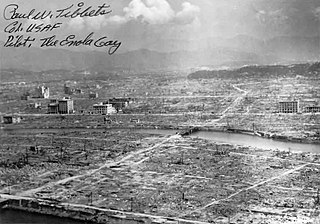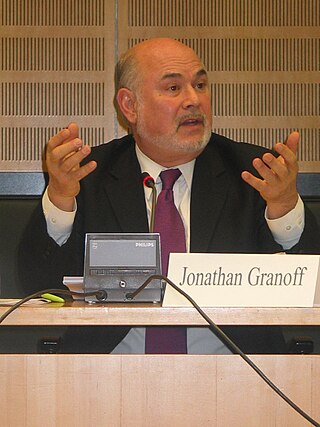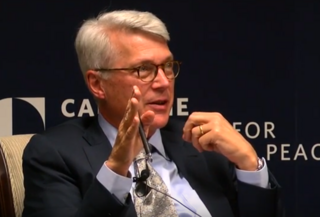Related Research Articles

The Treaty on the Non-Proliferation of Nuclear Weapons, commonly known as the Non-Proliferation Treaty or NPT, is an international treaty whose objective is to prevent the spread of nuclear weapons and weapons technology, to promote cooperation in the peaceful uses of nuclear energy, and to further the goal of achieving nuclear disarmament and general and complete disarmament. Between 1965 and 1968, the treaty was negotiated by the Eighteen Nation Committee on Disarmament, a United Nations-sponsored organization based in Geneva, Switzerland.

Nuclear disarmament is the act of reducing or eliminating nuclear weapons. Its end state can also be a nuclear-weapons-free world, in which nuclear weapons are completely eliminated. The term denuclearization is also used to describe the process leading to complete nuclear disarmament.

Samuel Augustus Nunn Jr. is an American politician who served as a United States Senator from Georgia (1972–1997) as a member of the Democratic Party.

Desmond Henry Browne, Baron Browne of Ladyton, is a Scottish politician who served in the Cabinet of the United Kingdom under Tony Blair and Gordon Brown as Secretary of State for Defence 2006 to 2008 and Secretary of State for Scotland from 2007 to 2008. A member of the Labour Party, he was Member of Parliament (MP) for Kilmarnock and Loudoun from 1997 to 2010.
The British American Security Information Council (BASIC) is a non-partisan think tank based in London. BASIC takes an inclusive approach to promote nuclear disarmament and non-proliferation by working with politicians, civil society, and other people who share this vision, as well as with those who might oppose it.
William C. Potter is Sam Nunn and Richard Lugar Professor of Nonproliferation Studies and Founding Director of the James Martin Center for Nonproliferation Studies at the Middlebury Institute of International Studies at Monterey (MIIS). He also directs the MIIS Center for Russian and Eurasian Studies.

As the collapse of the Soviet Union appeared imminent, the United States and their NATO allies grew concerned of the risk of nuclear weapons held in the Soviet republics falling into enemy hands. The Cooperative Threat Reduction (CTR) program was initiated by the Nunn–Lugar Act, which was authored and cosponsored by Sens. Sam Nunn (D-GA) and Richard Lugar (R-IN). According to the CTR website, the purpose of the CTR Program was originally "to secure and dismantle weapons of mass destruction and their associated infrastructure in former Soviet Union states." As the peace dividend grew old, an alternative 2009 explanation of the program was "to secure and dismantle weapons of mass destruction in states of the former Soviet Union and beyond". The CTR program funds have been disbursed since 1997 by the Defense Threat Reduction Agency (DTRA).

The nuclear weapons debate refers to the controversies surrounding the threat, use and stockpiling of nuclear weapons. Even before the first nuclear weapons had been developed, scientists involved with the Manhattan Project were divided over the use of the weapon. The only time nuclear weapons have been used in warfare was during the final stages of World War II when USAAF B-29 Superfortress bombers dropped atomic bombs on the Japanese cities of Hiroshima and Nagasaki in early August 1945. The role of the bombings in Japan's surrender and the U.S.'s ethical justification for them have been the subject of scholarly and popular debate for decades.

Jonathan Granoff is an American lawyer, screenwriter and lecturer, widely known as President of the Global Security Institute.

Scott Douglas Sagan is the Caroline S.G. Munro Professor of Political Science at Stanford University and co-director of Stanford's Center for International Security and Cooperation (CISAC). He is known for his research on nuclear weapons policy and nuclear disarmament, including discussions of system accidents, and has published widely on these subjects.

Irma Arguello is an international security expert from Argentina. She founded and chairs the Nonproliferation for Global Security Foundation, (NPSGlobal), a private, non-profit initiative oriented to help reduce risks derived from the proliferation and use of armaments, with a special emphasis on weapons of mass destruction. The organization is also devoted to building up adequate and opportune responses to such threats at all levels, in order to increase global security.
The International Conference on Nuclear Disarmament took place in Oslo on 26 and 27 February 2008. It was organized by The Government of Norway, the Norwegian Radiation Protection Authority in collaboration with the NTI and the Hoover Institute. The Conference, entitled "Achieving the Vision of a World Free of Nuclear Weapons", had the purpose of building consensus between nuclear weapon states and non-nuclear weapon states and about the importance of all the actions in the NPT.

Yukiya Amano was a Japanese diplomat and the Director General of the International Atomic Energy Agency (IAEA). Amano previously served as an international civil servant for the United Nations and its subdivisions.

George Pratt Shultz was an American economist, businessman, diplomat and statesman. He served in various positions under two different Republican presidents and is one of the only two persons to have held four different Cabinet-level posts, the other being Elliot Richardson. Shultz played a major role in shaping the foreign policy of the Ronald Reagan administration. From 1974 to 1982, he was an executive of the Bechtel Group, an engineering and services company. From 2011 to 2015, Shultz was a member of the board of directors at Theranos, misleading investors into investing in the company's fraudulent technology and going so far as pressuring his whistleblower grandson to remain silent about his accusations.
The International Luxembourg Forum on Preventing Nuclear Catastrophe — is an international non-governmental organisation uniting leading world-renowned experts on non-proliferation of nuclear weapons, materials and delivery vehicles.
The 2010 Review Conference for the Treaty on the Non-Proliferation of Nuclear Weapons (NPT) was held at United Nations Headquarters in New York City from 3 to 28 May 2010. The President of the Review Conference is Ambassador Libran N. Cabactulan of the Philippines. UN Secretary-General Ban Ki-moon used the opening of the conference to note that "sixty five years later, the world still lives under the nuclear shadow".

Nuclear Tipping Point is a 2010 documentary film produced by the Nuclear Threat Initiative. It features interviews with four American government officials who were in office during the Cold War period, but are now advocating for the elimination of nuclear weapons: Henry Kissinger, George Shultz, Sam Nunn, and William Perry. Michael Douglas narrated the film.
Ambassador Thomas Graham Jr. is a former senior U.S. diplomat. Graham was involved in the negotiation of every single international arms control and non-proliferation agreement from 1970 to 1997. This includes the Strategic Arms Limitation Talks, the Strategic Arms Reduction Treaties, the Anti-ballistic missile (ABM) Treaty, Intermediate-Range Nuclear Forces Treaty (INF) Treaty, Treaty on the Non-Proliferation of Nuclear Weapons Treaty (NPT), Treaty on Conventional Armed Forces in Europe (CFE) Treaty and Comprehensive Nuclear-Test-Ban Treaty (CTBT). In 1993, Ambassador Graham served as acting director of the Arms Control and Disarmament Agency (ACDA) from January to November, 1993 and Acting Deputy Director from November, 1993 to July, 1994. From 1994 through 1997, he was president Bill Clinton's special representative for Arms Control, Non-Proliferation, and Disarmament. Graham successfully led the U.S. government efforts to achieve the permanent extension of the NPT in 1995. Graham also served for 15 years as the general counsel of ACDA. Throughout his career, Thomas Graham has worked with six U.S. Presidents including Presidents Richard Nixon, Gerald Ford, Jimmy Carter, Ronald Reagan, George H. W. Bush, and Bill Clinton. Ambassador Graham worked on the negotiation of the Chemical Weapons Convention and the Biological Weapons Convention and managed the Senate approval of the ratification of the Geneva Protocol banning the use of chemical and biological weapons in war, as well as the Biological Weapons Convention.

European Leadership Network (ELN) is a pan-European think-tank focusing on European foreign, defence and security issues based in London, United Kingdom. The ELN's Director is Sir Adam Thomson, former UK Permanent Representative to NATO.

The Treaty on the Prohibition of Nuclear Weapons (TPNW), or the Nuclear Weapon Ban Treaty, is the first legally binding international agreement to comprehensively prohibit nuclear weapons with the ultimate goal being their total elimination. It was adopted on 7 July 2017, opened for signature on 20 September 2017, and entered into force on 22 January 2021.
References
- ↑ White October Ltd. "European Leadership Network". europeanleadershipnetwork.org.
- ↑ Richard Norton-Taylor (29 October 2009). "Retrieved 30 June 2010". Guardian. Retrieved 22 June 2014.
- ↑ George P. Shultz, William J. Perry, Henry A. Kissinger and Sam Nunn (4 January 2007). "A World Free of Nuclear Weapons". WSJ.
- 1 2 "Retrieved 30 June 2010". Toplevelgroup.org. Retrieved 22 June 2014.
- ↑ Retrieved 30 June 2010. Archived 22 February 2010 at the Wayback Machine
- ↑ "Retrieved 30 June 2010". Guardian. 14 April 2010. Retrieved 22 June 2014.
- ↑ "Retrieved 30 June 2010". Toplevelgroup.org. 28 April 2010. Retrieved 22 June 2014.
- ↑ "Members' Viewpoints". Top Level Group. Retrieved 22 June 2014.